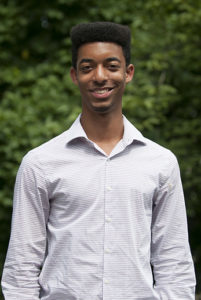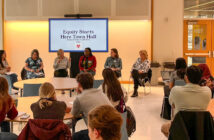I remember going on a movie date with a girl I knew during my sophomore year of high school.

Noah Jalango
After the movie finished, my date and I decided to walk around some of the bike trails surrounding the theater.
It was a warm, summery evening. The gnats were pesky, but not unbearable, and I was enjoying my time getting to know this girl a little bit better.
I soon heard a slight buzz that I recognized was different from the sound of the gnats. My phone was ringing.
As I pulled the phone out of my pocket, the lock screen was full of missed calls and text messages from my mom wondering where I was.
I quickly responded to the texts, assuring her that I was OK, and I told my date that I had to go home.
While I can’t remember what movie I watched that night, five years ago, I can vividly recall the emotions clouding my mom’s face when I finally arrived home.
Relief. Anxiety. Grief.
None of which I understood.
In my eyes, what happened that evening wasn’t anything unusual. I was merely hanging out with a girl from school.
In the eyes of the rest of the country, my mom explained, a black male and a white female in the same space at night is a cause for concern or, at the very least, suspicion.
She told me I need to be aware of both my surroundings and my actions because you never know who’s watching.
You never know who, with their own narrative in mind, will whip out their phone and call 911.
You never know who will take matters into their own hands.
Just like the racists who murdered Ahmaud Arbery, an unarmed black man, as he was jogging down the street.
Just like the police officer who murdered George Floyd, another black man, even though he was compliant with their orders.
As a single white woman raising two black children, my mom has been especially cautious raising me, her oldest child and only son.
She gets nervous when I’m out at night, whether it be with friends or on my own.
She makes sure that I always have some sort of ID with me in the event that I am ever approached by a police officer. She never tries to make her worries too obvious, as I assume she doesn’t want to deny me a chance at normalcy.
Imagine having to tell your children they can live a regular, happy life when you know the country that they reside in won’t offer them the same opportunities as their peers.
When you know that it’s only a matter of time before the next killing of a black American. Before the next hashtag.
As a black man, it’s difficult to live in a country where other black men are killed at such a high rate because of how they look.
It’s uncomfortable when so many of the people committing these murders are police officers — the very people who are supposed to be protecting our country and its citizens — and when our president refers to black people as ‘thugs’ and glorifies violence against black people protesting for change.
I sometimes can’t help but imagine what it will be like to give my children the same talk my mom gave me.
I think about how I would describe my black experience to them, and I wonder how theirs will look 20 or 30 years down the line.
To me, my black experience has meant always being aware of my surroundings.
It’s meant being asked throughout my entire life why I don’t play basketball.
It’s meant living with the fact that my father isn’t a part of my life and accepting the fact that I’m an easy target for jokes based on certain black stereotypes.
It’s meant being one of the few black students in many classes and programs I’ve been a part of throughout my education.
Heck, it’s even meant trying to explain all of the ideas I’m writing right now to my white peers.
In moments like the one we are living in now, moments full of death, violence and despair, empathy is crucial.
My experience as a black American may share similarities with the stories of others, but it is not the only experience.
All I ask of you, the reader, is to look at my writing with an open mind and realize that different groups of people in the United States grow up and experience life in different ways.
Be aware not only of your surroundings, but of the surroundings of your black peers, too.
Learn to see the problems they face on a regular basis, and stand with them.
Don’t be silent.
Take action.
Noah Jalango is a managing editor for The Brown and White. He can be reached at nfj221@lehigh.edu.





Comment policy
Comments posted to The Brown and White website are reviewed by a moderator before being approved. Incendiary speech or harassing language, including comments targeted at individuals, may be deemed unacceptable and not published. Spam and other soliciting will also be declined.
The Brown and White also reserves the right to not publish entirely anonymous comments.
1 Comment
It’s always productive to empathize with others and to treat everyone with respect.